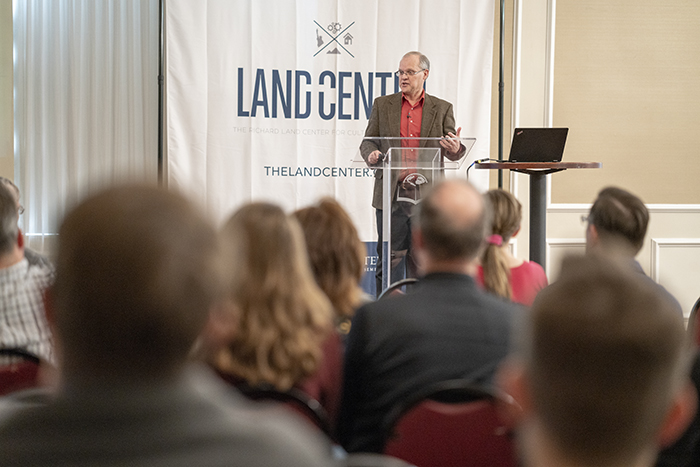Land Center, Tandy Institute co-host lecture on relationship between Christianity and science

Southwestern Baptist Theological Seminary welcomed Edward Davis, professor of the history of science at Messiah College, to lecture on Christianity and science, March 19. The lecture was hosted by the Richard Land Center for Cultural Engagement in partnership with the Charles D. Tandy Institute of Archaeology. Faculty, students, and the general public were welcomed to join this free lecture and participate in a Q&A session with the speaker.
During his lecture—entitled “Why History Matters: Exposing the Ideological Roots of the ‘Conflict’ Model of Christianity and Science”—Davis addressed some of the common and long-standing beliefs that Christianity and science are in and have always been in an ongoing conflict.
Davis, who has devoted much of his career to the research of the relationship between science and religion, stated that the conflict model is actually a myth rooted in and further spread by the false claims made by the American scholars Andrew Dickson White and John William Draper, both coming to prominence in the mid- to late-19th century.
During his lecture, Davis discussed several examples of Christian belief and science actually working in harmony, as well as the examples of such scholars as White and Draper perpetuating the false claims that Christianity was a historical hindrance to the progress of science.
Beginning with Andrew Dickson White, an American historian and co-founder of Cornell University, Davis addressed White’s beliefs, writings, and notable 1869 lecture “The Battlefields of Science.” In this speech, White stated his belief that historical events proved the negative effects of Christianity’s involvement in science.
“White found himself with a great platform from which to launch his ideas about conflict between modern knowledge, including science, and traditional Christian beliefs,” Davis said, adding that for the entirety of the evening he “entertained the audience with outlandish facts.” Now, Davis added, while there might still be an ongoing conversation among religion’s harshest critics, many of White’s claims have been widely disproved by modern historians.
Davis continued with the teachings and writings of John William Draper, a chemist and historian who became the first president in the American Chemical Society and one of the founders of New York University’s School of Medicine. Draper’s origins were in chemical research, but he later devoted his career to the research and writing of religion’s impact on science in Western history. In his book “The History of the Conflict between Religion and Science,” Draper proposed another conflict thesis, identifying two conflicting forces in culture. Modern historians, Davis added, have also disproved Draper’s claims.
In conclusion, Davis said many of the false claims made by White and Draper have, over time, disappeared from the general culture, but some ideas still linger, particularly from groups who attempt to “dismiss religious ideas as unworthy of serious consideration,” he said. “When in fact, religion has very often been a source of energy and ideas in the history of science.”
To learn more about Southwestern Seminary’s Land Center for Cultural Engagement and future events and lectures, visit thelandcenter.org, and for more information about the Tandy Institute, visit tandyinstitute.org.



